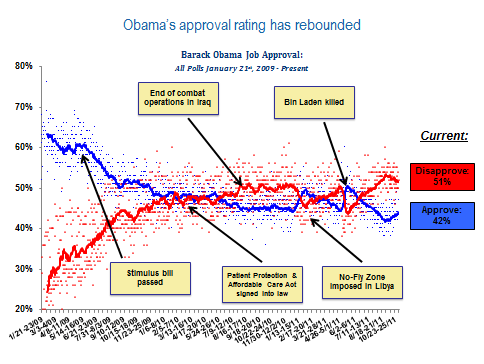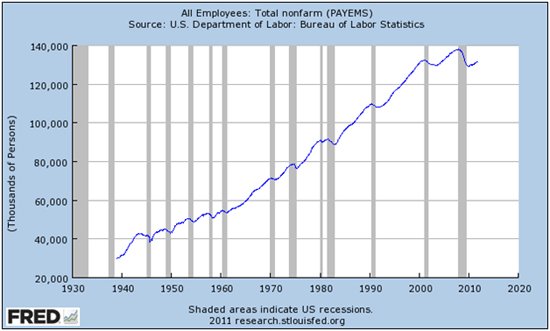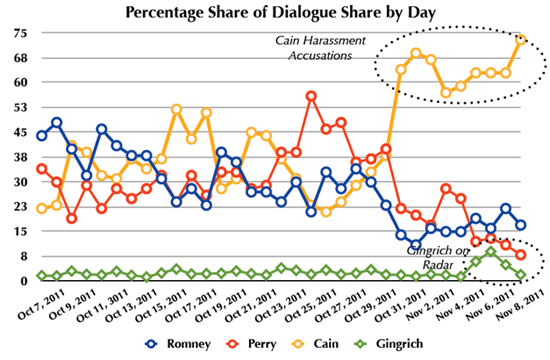Friends,
In the last 48 hours we have learned that Iran has approached a nuclear capability, Italy is on the brink of economic catastrophe, the stock market is in a serious dive over the pending Euro collapse and the media focus has almost exclusively been about Herman Cain and Joe Paterno. Not to take away anything from the seriousness and tragedy of the Cain and Penn State issues, but their dominance of the national dialogue for the last week has been a political gift for President Obama. Without them, the public focus would be on the aforementioned geopolitical and economic events, very much to the detriment of the president's re-election campaign. Sometimes, being lucky is better than being good.
Here is a quick snapshot of the current political environment:
- Obama has regained his footing and to some extent his voice. While it may not serve them well in the general election, Obama's class warfare strategy has re-energized his base and served to give him a firm positioning. While the Occupy Wall Street movement is also responsible for shifting our national conversation away from deficits and back to economic inequality, the White House has been smart to capitalize on the emotions stirred by the protests without aligning too directly with the multifarious, leaderless movement.
- Herman Cain has sucked all the oxygen out of the GOP race and it is hurting Romney. Ultimately, Romney may benefit from the eventual (still pending) Cain free-fall, however, at this point the issue has made Romney temporarily invisible. This comes at a time when Romney appeared more confident and ready to make a move. The fact that the GOP comments on Iran and the state of the economy have been akin to the tree falling in the forest with no one to hear it has made this a lost two weeks for the party. Every Cain headline is a win for team Obama.
- The 2011 elections tell us almost nothing about what will happen in 2012. To pick just one example, the total turnout in Ohio was a little more than half of what it was in the 2008 presidential election. It does tell us (as did 2010) that politicians and parties get in trouble (see Kasich in 2011 and Obama in 2010) when they over interpret an electoral victory as a mandate. We will see if the same holds true for Democrats and unions in Ohio in 2012.
- Last night's debate again reminds us that Romney is more poised and prepared than his major rivals. The most fascinating storyline may be Herman Cain avoiding any on-stage embarrassments related to his alleged sexual misconduct. But the most important strategic outcome for this race is that Romney is consistently outshining Rick Perry. Romney turned in another solid performance, appearing at ease in espousing his economic principles. One moment that felt a little off-key was when in response to a question about changing his positions, Romney proclaimed himself to be a man of "steadiness and constancy." Still, that was nothing compared to the flub by Rick Perry, who could not remember that the Department of Energy was one of three agencies he wished to eliminate. At this point, it seems Perry's nervousness about his previous poor debate performances is making him to tense to deliver.
We are on record as saying that unless there is a meaningful improvement in the economy, Obama is a one-term president. The question is, what constitutes meaningful improvement? There are two recent presidents who suggest the paths Obama's electoral chances could take from here. Both Ronald Reagan and George H.W. Bush faced recessions that began shortly after they were inaugurated to their first term, with unemployment rates similar to today (9.2% in November 1983 and 7.0% in November of 1991). Thanks to a strong recovery, Reagan was able to declare "Morning in America" and won re-election in 1984. No economic narrative could save Bush, who was undone by a still-sluggish economy and the confounding independent campaign of Ross Perot. We don't mean to suggest that Obama needs to watch his flank for an independent challenger; the lesson is that the recovery was not swift enough to save him. His successor, Clinton, would go on to ride the rebound from that recession into the boom of the mid-90s for two terms of his own.
For Reagan, the key was this: in the twelve months from November 1983 to November 1984, the number of employed Americans increased by 3.2 million, driving the jobless rate down to 7.5%. Today, with the increased size of U.S. population, the net job creation needed to drive the unemployment rate below 7.5 percent by November 2012 would be approximately 4 million. While that is certainly possible, the Euro crisis and the apparent commitment of both parties to not compromise on major legislation before next November do not bode well. If the economy remains stagnant, at this time next year Obama will be having a lonely post-election Wednesday.
Here are some of the internals that drive our perspective this month:
- Obama's approval rating has rebounded in recent weeks. It is not clear at this point what is driving this change. Our sense is that some of it is due to the media's increased, generally negative coverage of the Republican field. This three-point gain may not appear much, but it has been consistent in surveys of all adults, voters and independents, suggesting that it is real. And with Obama likely needing to get to the 44/45% approval range to have a better than 50-50 shot of winning reelection, he is in the territory where every point counts.

- The only way to know who the next president will be is to know whether the economy will recover in the next year. As we mentioned above, the economy will need to add a staggering number of jobs to achieve a real recovery by Election Day. One thing that is sometimes lost when looking only at the unemployment rate is that the size of the workforce changes, in addition to the number of actual jobs. The chart below from the St. Louis Fed shows aggregate (non-farm) employment. As you can see, we still have fewer jobs in this country than we did prior to the start of the 2001 recession. Employment-wise, it truly has been a lost decade.

- The fragile Obama coalition can also be seen in the head-to-head results between Obama and Romney in the USA Today poll of twelve battleground states: it's a tie. Romney received 47% of votes and Obama was in a statistical tie with 46%. (Go here for more results and the poll's methodology.) Most voters are still hardly paying attention and not a single GOP primary vote has been cast yet, so we think that it's still far too early in the process to put much stock in horserace polling. Still, if the election were being held today, we think it would indeed be too close to call. As we noted in our last edition, it is these Rust Belt swing states where the Recession has been deepest.
- Herman Cain is tied with Mitt Romney in the latest Gallup survey but don't call it a race just yet. Our sense is that the details emerging are making the story worse for Cain. And as you can see in the chart below from our friends at TargetPoint Consulting, this story is overshadowing the conversation about the Republican field -- which as we argue above, is largely detrimental to the GOP as a whole. For most of October, Cain, Perry and Romney all received similar numbers of mentions in both traditional and social media. But since the story about the Cain allegations broke, stories about his alleged harassment have dominated the dialogue. Several prominent early Cain supporters, including RedState's Erick Ericson, are now distancing themselves from him.
